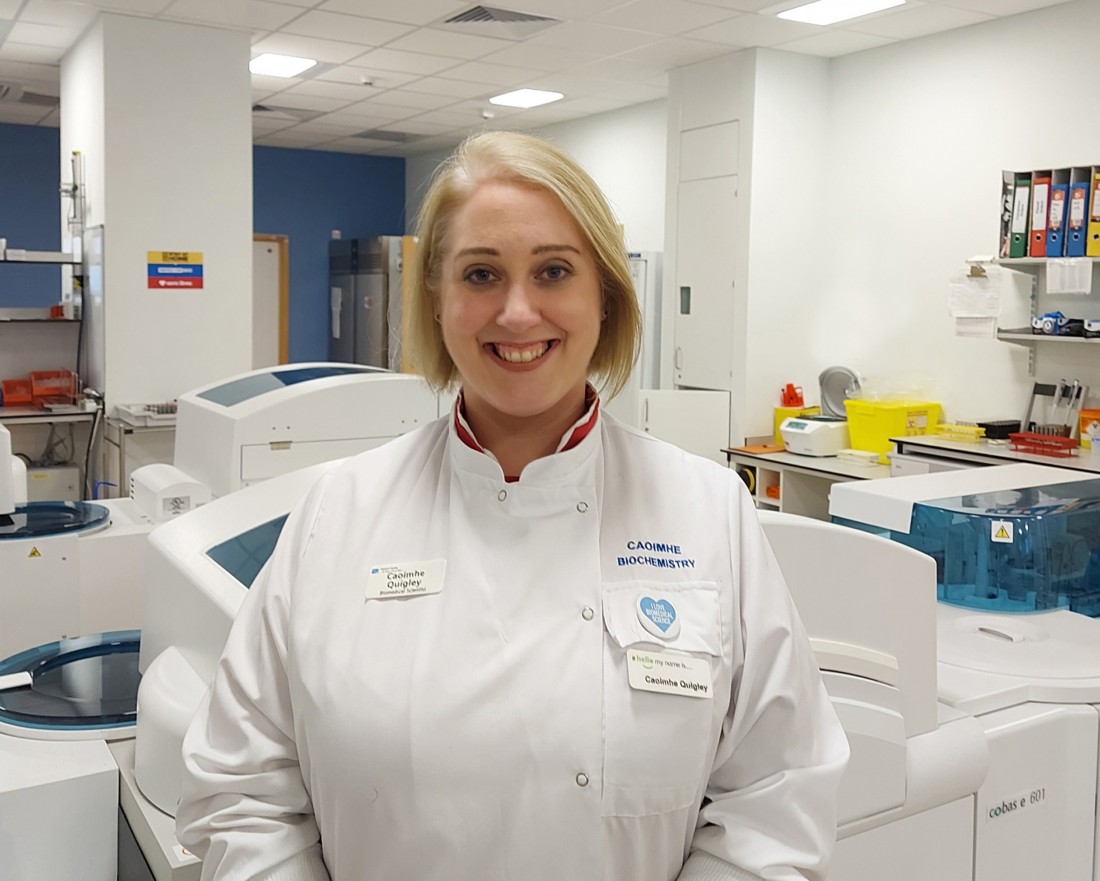Testing is central to the battle to contain Covid-19 and Enniskillen’s Caoimhe Quigley gives an insight into the invaluable work being carried out at SWAH laboratories.
Can you explain the role biomedical scientists in the fight against the virus.
Biomedical scientists and Healthcare Science Assistants work in healthcare laboratories diagnosing diseases and evaluating the effectiveness of treatment by analysing fluids and tissue samples from patients.
Biomedical scientists and the laboratory team are the workforce behind every Covid-19 test. Here in the South West Acute Hospital labs, we receive the patient swab samples and make them safe to transport to Altnagelvin Hospital where local testing using molecular technology has commenced. This has been a joint effort between the Microbiology and Cellular Pathology laboratories. Molecular detection of viral genetic material (in this case RNA) is the gold standard for detecting active infection. These tests, known as nucleic acid amplification tests (NAAT, also called PCR; polymerase chain reaction) are sensitive and specific for the virus SARS-CoV-2 (novel Coronavirus 2019) which is the agent identified as the cause of the disease Covid-19
The tests could not be developed, or scaled up until fundamental information about the virus was known, ie its genetic code. All results are reported directly back to the care team.
Over 70% of all diagnoses in the NHS are based on pathology results provided by laboratory services, and though we are often described as a hidden workforce, our NHS colleagues and the rest of the public are beginning to truly understand our role at the heart of healthcare.
What does your daily work day entail?
In addition to helping the fight against Covid-19, the laboratory team provides the medical team with the vital information of laboratory investigations allowing them to make informed clinical decisions for a variety of patients. We ensure blood stocks are adequate at critical times, match blood to patients, measure chemicals to monitor patient conditions, investigate disease by looking at tumour samples and identify microorganisms in the fight against infection.
How has your role changed since the beginning of the outbreak, and has your workload increased?
Social distancing has become as important in the workplace as in the home. We have taken the necessary steps to reduce footfall through the laboratory by working in smaller teams and altering our work patterns.
This allows us to be fully prepared if a member of staff becomes unwell and the other members of that team have to self-isolate. The laboratory management structure have been working closely with other teams throughout the hospital to ensure these contingency plans are in place.
Covid-19 has been designated as a Hazard Group 3 pathogen by the Advisory Committee on Dangerous Pathogens, which requires that laboratories have appropriate measures in place to ensure the safety of staff. Some of these extra measures include different pre-analytical processes such as preparing patient samples for testing in a specialised Category 3 Room, wearing additional PPE for processing specimens and having separate equipment.
It must be an emotional time for you, your colleagues and family how do you support each other?
The support from our local community and across the whole hospital setting has been so encouraging. We have been able to witness first-hand the work being done by teams full of care, compassion and courage and draw strength from the incredible public support.
There is also a great deal of personal satisfaction of using our scientific knowledge and research skills to investigate disease to help our medical colleagues save the life of a patient.
We are a relatively small team in the laboratory and the camaraderie among work colleagues has been wonderful in getting us through this difficult time. Everyone has been looking out for each other.
There are many support helplines available to all staff and messages of #WeAreWithYou really reinforce the fact that we are one team.
What advice would you have for members of the public to help support the local health service at this time?
Each of us has a role to play in interrupting transmission of Covid-19 . The best weapons we have to fight COVID-19 are our own actions. Stay apart, stay home and wash your hands.
Every home in the country is equipped with the best available item of PPE to shield the NHS against Covid-19: the front door.
We have seen a tremendous national effort to stop the spread of this virus and protect the vulnerable. It is so important that we keep it going.
Please, stay home, protect our health service. Save lives.
Posted: 6:12 pm April 18, 2020









